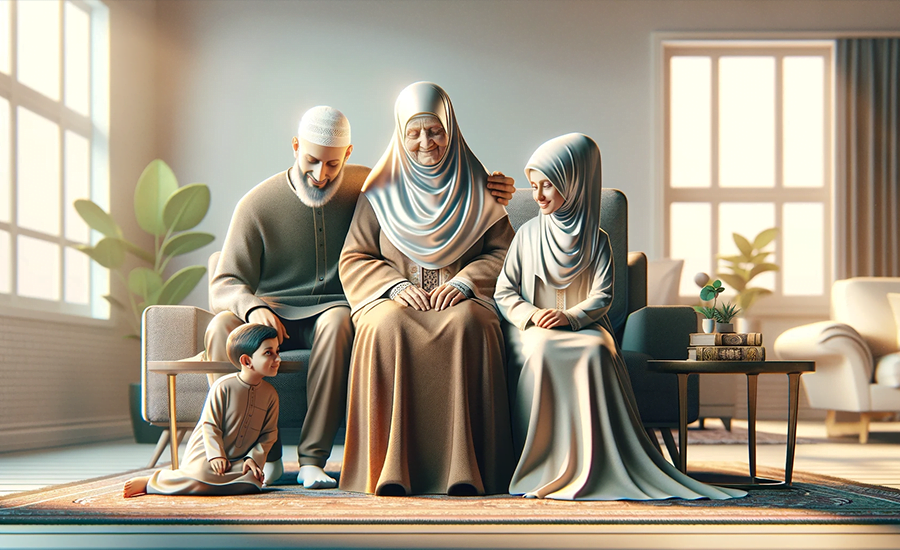
“Rights of Parents” – a phrase deeply embedded in the Islamic faith, reflects a fundamental aspect of Muslim culture. The importance of parents in Islam goes beyond mere respect and care; it is about reverence, love, and a lifelong commitment to their well-being. This article delves into the profound significance of parental rights in Islam, exploring how these rights shape familial relationships and individual responsibilities.
The Essence of Parental Rights in Islam (والدین کے حقوق)
Islam places immense emphasis on the rights of parents, considering serving them as one of the highest virtues. The Quran and Hadith extensively highlight how children should treat their parents with utmost respect and kindness, especially in their old age.
The Story of Prophet Musa and Parental Respect (جنت کا ساتھی)
The story of Prophet Musa (عَلَیْہِ السَّلَام) meeting a devout man, who attained paradise for his exemplary service to his elderly parents, is a powerful reminder in Islamic teachings about the importance of parental care.

Parental Status in the Light of Quran (والدین کی شان بزبان قرآن)
The Quran explicitly commands kindness to parents, forbidding even a word of contempt (‘Uff’) towards them. This directive shows the high status Islam gives to parents, urging children to treat them with compassion and humility.
Prophetic Teachings on Parents (احادیث مبارکہ)
The Hadiths of Prophet Muhammad (صَلَّی اللہُ عَلَیْہِ وَاٰلِہٖ وَسَلَّم) reinforce the significance of pleasing one’s parents, equating their satisfaction with Allah’s pleasure, and their displeasure with His displeasure.
The Unique Position of Mothers (ماں کی شان)
Islam elevates the status of mothers, emphasizing their unparalleled role in a child’s life. The famous Hadith stating, “Paradise lies under the feet of your mother,” underscores this point.
The Dignity of Fathers (باپ کی شان)
Fathers in Islam are accorded great respect for their role as providers and protectors of the family. The teachings of the Prophet stress the importance of obeying and serving one’s father.
Modern Challenges in Upholding Parental Rights
Today’s societal changes, including the trend of old age homes, present challenges in fulfilling parental rights in Islam. The article discusses these issues and offers insights into maintaining the Islamic ethos of parental reverence in contemporary times.
Conclusion:
In conclusion, “Rights of Parents” in Islam is not just a religious obligation but a cornerstone of Muslim social fabric. It’s a divine commandment that shapes the moral and ethical framework of Muslim societies. By understanding and practicing these teachings, Muslims can not only ensure harmonious familial relationships but also contribute to building compassionate and respectful communities. May Allah grant us the ability to fulfill our duties towards our parents with love, respect, and patience. Ameen.
FAQs:
Q: What does Islam say about treating parents?
A: Islam instructs to treat parents with utmost respect, kindness, and compassion, as emphasized in both the Quran and Hadith.
Q: Is there a special status for mothers in Islam?
A: Yes, Islam gives mothers a very high status, with Prophet Muhammad (صَلَّی اللہُ عَلَیْہِ وَاٰلِہٖ وَسَلَّم) stating that “Paradise lies under the feet of your mother.”
Q: How does Islam view disobedience to parents?
A: Disobedience to parents is considered a major sin in Islam, and it’s believed that Allah’s displeasure is linked to the displeasure of one’s parents.
Q: Are there specific prayers or supplications for parents in Islam?
A: Yes, Muslims are encouraged to regularly pray for their parents’ well-being and forgiveness, as mentioned in the Quran: “My Lord, have mercy upon them as they brought me up [when I was] small.”
Q: Can taking care of parents lead to rewards in the hereafter?
A: Absolutely, caring for one’s parents is vital. Showing kindness is a deed of great merit. It leads to blessings and rewards in the hereafter.
Source:
Dawat e Islami